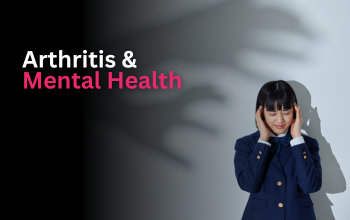The Arthritis Newsletter
Winter 2014I Have RA … Here’s what not to say!
By Nadia Prestley
In which the author provides advice on how to talk with someone who is struggling with arthritis.
People living with Rheumatoid Arthritis (RA) benefit greatly from the support of friends and family. Sharing the challenges we face with those we trust can be helpful, and it can also open the door to well-meaning advice. However, how someone offers advice can be as important as the advice they are giving. When the advice is presented in a manner that may be interpreted as criticism, it can cause us distress. The following are six statements that have been directed to various Arthritis Patient Advisory Board (APAB) members. Our aim is to show how these statements affected us, possible ways to provide better support, and what RA patients can do to avoid these conversations.
“Chin up, at least you don’t have cancer”
What we hear: “It’s not that bad!”
Reality: This statement trivializes our disease, and will certainly stop the conversation.
How you can help: Ask questions, listen to understand, and learn as much as you can about RA. The knowledge you gain will help you appreciate how drastically RA can impact someone’s quality of life, enabling you to provide better support. Remember, there is no cure for RA; the best we can hope for is clinical remission.
Patients: An APAB member once said that when talking to others about our disease, we should “Explain: Not Complain”. This advice may help us avoid being perceived as whiners. On the other hand, if you are finding yourself unable to cope, your symptoms may be poorly managed, in which case you should see your health care provider as soon as possible.
Video: The Aim of Treatment is Remission
“My aunt has RA and she doesn’t let it slow her down.”
What we hear: “… as opposed to you.”
Reality: People living with RA experience different levels of pain and disability. Also, they can experience higher disease activity (flares) or little disease activity (clinical remission).
How you can help: Avoid making comparisons. Instead, ask considerate questions such as, “I’ve noticed you haven’t been walking lately. Are you experiencing a flare?”
Patients: Make this a teachable moment – explain, explain, explain! The more information people have, the more seriously they will treat this disease.
Newsletter Article: Arthritis: Turning Your Family Up-Side-Down
“You have to stay positive.”
What we hear: “You are a complainer!”
Reality: Again, this shows a lack of understanding about the devastating impact of having RA. Those of us living with RA do the best we can; however, there are times when pain, fatigue, fear, and uncertainty can contribute to a depressed mood. When we are only valued for our endurance in the face of adversity, we fear showing vulnerability, and this can lead to a feeling of loneliness.
How you can help: Reaching out with compassion to someone who may be suffering from depression can be beneficial. Sometimes a person needs an opportunity to be angry or cry; expressing those feelings can make us feel better.
Patients: See your health care provider as soon as possible if you are suffering from depression or you are unable to cope.
Video: Arthritis and Depression: In the Mood to Move?
“Those medications can kill you!”
What we hear: “You are making bad health-care choices!”
Reality: This statement can put undue pressure on the patient to question their health-care decisions. RA patients are aware that certain medications can have serious side effects. We have read the pamphlets that accompany our medications, we’ve talked to our doctor, and we understand the risks. However, when the benefits outweigh the risks, it is an obvious choice. And, when these medications improve our daily quality of life or help us achieve clinical remission, we know we’ve made the right decision.
How you can help: If a friend/family member has confided in you regarding their treatment plan, and you are worried, instead of alarming your loved one, ask how the medication works and why the choice was made to take this medication. This may put your fears to rest.
Patients: Be aware of the symptoms especially those which accompany any serious side effects. Perhaps reassure those who are concerned or curious that screening procedures and periodic monitoring of blood tests by your doctor to enhance safety is a protocol for some medications (e.g. biologics).
Newsletter Article: Take Your Meds…
“Let me know if you need anything.”
What we hear: “It’s your responsibility to ask for help.”
Reality: This statement is an act of kindness, but it does put the burden of asking for help on the patient.
How you can help: Perhaps ask, “How can I help?” Or, be specific. For example, if the person living with RA has difficulty buying groceries, offer to go to the supermarket together to lend a hand.
Patients: As difficult as it may be, there is no shame in letting someone help you – wouldn’t you do the same for your friend/family member?
Video: The Impact of Arthritis on Moms
“There is always something wrong with you.”
What we hear: “You are a hypochondriac.”
Reality: Many people characterize rheumatoid arthritis by pain and joint deformities. What is not commonly understood is that people living with RA can also be plagued by other symptoms including chronic fatigue and depression. They are also at increased risk for developing comorbid conditions such as cardiovascular disease and infections. (Note: Comorbid means existing simultaneously with and usually independently of another medical condition. Ed.)
How you can help: Learn about the comorbid conditions that may accompany their disease. Validate their struggles and give them credit for managing these obstacles.
Patients: Knowledge is Power. Learn as much as possible about these comorbid conditions and how to manage or prevent them
Videos: How arthritis causes heart attacks, strokes, and blood clots, Who is at risk of heart disease and why?, How you can prevent heart disease.
Thanks to research breakthroughs, persons living with RA have better outcomes, and, fortunately, research teams tirelessly continue to investigate and develop new treatments and protocols – this support to our cause is appreciated beyond measure. But those who provide support in our every-day lives are also appreciated – that support has made our lives better, much better – Pablo said it best, “Never underestimate the difference you can make in the lives of others.” So, from researchers to those who simply listen and provide warm hugs – THANKS FOR CARING!





















































